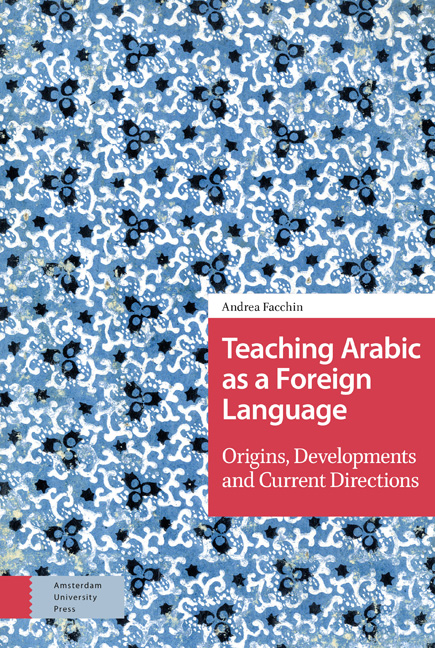Book contents
- Frontmatter
- Contents
- Acknowledgments
- Transliteration
- List of Abbreviations
- Arab World Map
- Introduction
- 1 The Historical Background
- 2 The Birth of a New Branch
- 3 Growth (1970s)
- 4 Development (1980s)
- 5 New Challenges (1990s)
- 6 In the Twenty-first Century (2000-2010)
- 7 The Present Period
- Conclusions
- List of Events
- A TAFL Who's Who (1958-2018)
- TAFL Institutes (1958-2018)
- Tables
- Bibliography
- Index
- Frontmatter
- Contents
- Acknowledgments
- Transliteration
- List of Abbreviations
- Arab World Map
- Introduction
- 1 The Historical Background
- 2 The Birth of a New Branch
- 3 Growth (1970s)
- 4 Development (1980s)
- 5 New Challenges (1990s)
- 6 In the Twenty-first Century (2000-2010)
- 7 The Present Period
- Conclusions
- List of Events
- A TAFL Who's Who (1958-2018)
- TAFL Institutes (1958-2018)
- Tables
- Bibliography
- Index
Summary
This study is focused on the genesis, developments and current directions of the discipline called Teaching Arabic as a Foreign Language (TAFL) within the Arab world between 1958 and 2018. The goal of this research is to outline a historical overview of the evolution of the discipline from the onset to the present. Although the study focuses mostly on the last 60 years, a general analysis of the previous period is given in order to allow the reader to understand the historical contexts of today's trends. The most influential scholars, authors, educators and those significant works that contributed to the development of the discipline are all considered. In addition, special attention is paid to the TAFL institutes, which are regarded as epicenters of the activities and important meetings, allowing scholars to gather around the same table and discuss approaches, trends and methods used in the TAFL field. All these aspects converge in one comprehensive study – the first of its kind – which is enriched by the narration of the main sociopolitical changes that have affected the Middle Eastern region in latter-day history.
Recent years have seen the publication of some influential works in the TAFL field (e.g., Wahba, Taha, and England; Aguilar, Pérez Cañada, and Santillán Grimm; Ryding 2013; Aguilar et al.; Younes 2015; Alhawary 2018b; al-Batal 2018; Wahba, England, and Taha). These seminal publications report the best practices, scientific advance and brand-new perspectives in the field, which mainly describe TAFL in European and North American contexts, besides some significant contributions concerning Arab experiences (e.g., Nahla; al-Rajhi; Awaiss; Chekayri 2010). The fact that such a prolific piece of writing is witnessed outside the Arab world can be explained through the words of some Arab TAFL authors (Makkī; Fahmī; Badawi 1992a; al-ʿUṣaylī 2002), who pointed out that the discipline is the fruit of the interplay between Arab and non-Arab scholars. In this sense, the aforementioned works take into account an important slice of the literature on TAFL.
Nevertheless, today there is little knowledge on the debates and discussions carried out by Arab TAFL scholars within their homelands during the second half of the twentieth century and the beginning of the present one. Furthermore, no complete study on the topic has been published yet.
- Type
- Chapter
- Information
- Teaching Arabic as a Foreign LanguageOrigins, Developments and Current Directions, pp. 11 - 24Publisher: Amsterdam University PressPrint publication year: 2019

